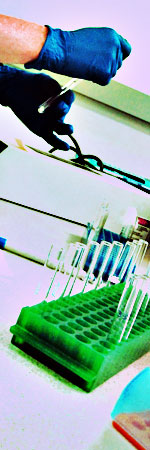Home | Glossary | Resources | Help | Contact Us | Course Map
Archival Notice
This is an archive page that is no longer being updated. It may contain outdated information and links may no longer function as originally intended.
Need for Analysis in a Different Technology
A governmental laboratory may outsource casework to a laboratory offering analysis in a technology for which the government laboratory is not proficient. Examples of this type of analysis include Y chromosome (Y-STR), mitochondrial DNA (mtDNA), paternity and other specialty testing. Most governmental laboratories conduct nuclear STR DNA analysis, but on a case-by-case basis, they may need to outsource the analysis for one or more specialty testing methods that they lack the ability to perform. The governmental laboratory may decide that the number of cases involving specialized analysis is not significant enough to justify the expense of providing these services in-house. To be fiscally responsible, laboratories will temporarily use another facility to fill these needs.
Requests to Observe the Analysis
There are occasions when a laboratory receives a request to have the analysis observed by another expert. Most public crime laboratories are not set up to adequately accommodate these requests for liability purposes and the confidentiality of other cases. There are private DNA laboratories that are set up with viewing areas and allow for observing the analysis.
Additional Online Courses
- What Every First Responding Officer Should Know About DNA Evidence
- Collecting DNA Evidence at Property Crime Scenes
- DNA – A Prosecutor’s Practice Notebook
- Crime Scene and DNA Basics
- Laboratory Safety Programs
- DNA Amplification
- Population Genetics and Statistics
- Non-STR DNA Markers: SNPs, Y-STRs, LCN and mtDNA
- Firearms Examiner Training
- Forensic DNA Education for Law Enforcement Decisionmakers
- What Every Investigator and Evidence Technician Should Know About DNA Evidence
- Principles of Forensic DNA for Officers of the Court
- Law 101: Legal Guide for the Forensic Expert
- Laboratory Orientation and Testing of Body Fluids and Tissues
- DNA Extraction and Quantitation
- STR Data Analysis and Interpretation
- Communication Skills, Report Writing, and Courtroom Testimony
- Español for Law Enforcement
- Amplified DNA Product Separation for Forensic Analysts


